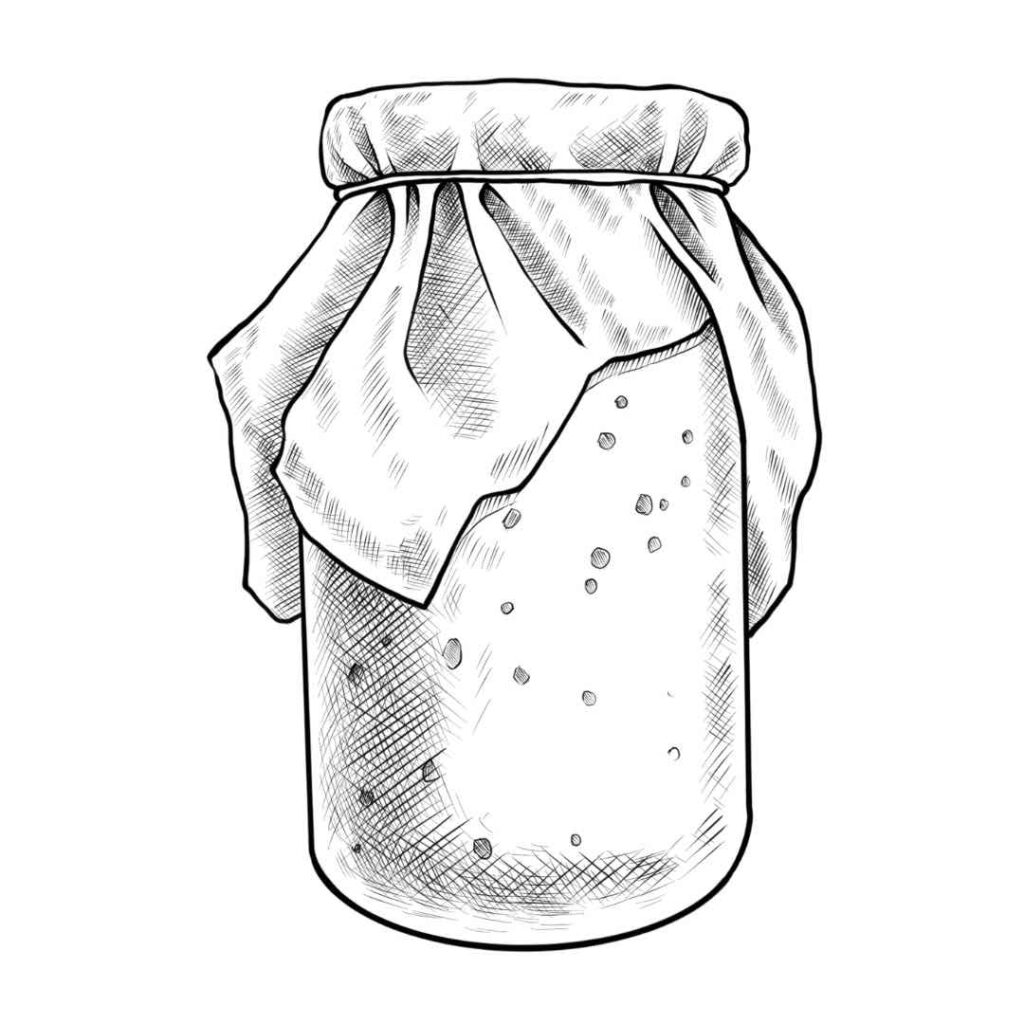
Indian Style Paprika–Cumin–Turmeric Spice Rub
A salt-free, Indian-style spice rub with paprika, cumin and turmeric. Warming, aromatic and perfect for vegetables, legumes and slow cooking.
Original Article published in MaatschapWij, translated with permission
As a regenerative farmer, I feel an inner struggle—one of philosophical proportions. Where do we, as humans, stand on this earth? If everything we do is so unnatural, then what are we? I love the natural world, and I feel this most strongly when I’m harvesting on the farm. Yet, it is often said that agriculture, by definition, is not a “natural” process. And this is something I wrestle with. I’d like to give you a glimpse into my inner turmoil. I often wonder whether my beliefs hold up. That’s why I’m eager to hear your thoughts!
What does ‘natural’ even mean? Should we stick to the official definition? The dictionary defines ‘natural’ as: Existing in or formed by nature; not made or caused by humans. If we accept this definition blindly, it fundamentally places us outside of nature, as if we are separate from it—mere manipulators, rather than participants.
Yet, this is precisely the idea I reject. Perhaps it’s unexpected for an organic, regenerative farmer to say this, but I don’t believe that we are truly separate from nature. I am against the use of synthetic chemicals in agriculture, yet I can also argue that, in a way, they are natural—because we created them, and in my view, we are part of nature. I advocate for working with ecosystems rather than disrupting them. But does that mean I oppose human influence? Do I believe that humans exist apart from nature and only harm it? Absolutely not.
I see no evidence that we are separate from nature. In my view, we are just as much a part of this system as a tree, a fungus, or a bird. The only thing that sets us apart is our perception of separation and the arrogance that comes with it.
“The only thing that sets us apart is our perception of separation and the arrogance that comes with it.”
Yes, we have consciousness. We have developed tools and technology, performed wonders in the field of chemistry. We have beliefs, philosophies, and opinions. We can think about the fact that we are thinking. But this does not prove that we exist outside of nature—it only proves that we can analyze our own existence. And how far are we capable of determining this for other species? They don’t have our kind of “consciousness.” But does that mean that nothing similar happens in their world—unseen to us, yet no less real?
We believe we are becoming more knowledgeable, but our brain’s capacity is not limitless. We can discover and learn more, but we can never store it all simultaneously. So what are the conclusions we draw really worth? Even artificial intelligence must be trained based on certain assumptions. And those assumptions originate from humans.
Our perception of reality is shockingly limited. We see only a small part of the light spectrum, hear just a narrow band of sounds, and struggle to understand how everything is interconnected. We once thought plants were passive organisms, but now we know that they communicate and that trees exchange resources underground through fungal networks.
For centuries, we believed that the synthetic materials we created—like plastic—would last forever and were untouchable by natural processes. Now we are discovering that even plastics, industrial chemicals, and heavy metals—things we consider “unnatural”—are ultimately broken down by bacteria and fungi, given enough time. Nature is relentless in its interconnectedness, always adapting, absorbing, and transforming.
“Nature is relentless in its interconnectedness.”
We are, in the grand scheme of things, both highly capable and blinded by our own limitations. We believe we are in control, but nature continually proves otherwise. In the short term, we seem to manage things, but in the long run, we never fully control nature. We pursue an ultimately optimized world, but what kind of world would that be? Would we even want to live in a world of straight lines and automated processes?
Why do we cling to the idea that humans are different? That we exist outside the natural order? That our intelligence, our ability to build and create, sets us apart from the system that sustains us?
I believe this separation is an illusion—an illusion that has led us to deplete land, treat animals solely as products, and destroy ecosystems as if they are merely resources, rather than essential components of a larger balance. It is this illusion—this arrogance—that has led to extractive agriculture, industrial pollution, and for many, an increasingly meaningless life—a life of consumerism, while people seem to crave meaning more than ever.
We are still part of this world. We eat from it. We breathe it in. When we die, we return to it. In my eyes, we are not masters of nature; we are participants in it, whether we acknowledge it or not.
“The first important step is to change how we see ourselves.”
I believe the first step toward a truly healthy and fulfilling way of life is to change how we see ourselves. How we farm or consume is a consequence of that shift. We need to let go of the illusion of separation. Not to reduce ourselves to insignificant specks in the vastness of nature (“What do I even matter among billions of people?”), but to see ourselves as influential parts of a wondrous, larger whole—one we do not fully understand but that radiates beauty and grandeur.
Traditional science has often viewed the world through a mechanistic lens—a collection of separate parts functioning like a machine. But modern insights into complex systems—from regenerative agriculture to neuroscience—show that reality is far more intertwined, adaptive, and self-organizing than we ever imagined.
Take regenerative agriculture as an example. It thrives not because a farmer controls every variable, but because the land itself has an inherent intelligence—the ability to heal, to maintain balance, and to support life, as long as the right conditions are met. When we farm regeneratively, we do not force nature into submission; we work with its intrinsic wisdom. We understand that our interventions have consequences beyond our imagination, and that our actions should serve not only ourselves but a greater whole. I always think of the People-Profit-Planet framework. It must remain in balance.
Nature operates on a level of cooperation and intelligence beyond human control. Look at mycorrhizal networks in forests—fungi that connect trees, exchange nutrients, and even allow plants to “communicate.” The survival mechanism of the fungi serves not only themselves but the whole system.
“Could ‘God’ simply be the consciousness of nature?”
If we define intelligence as adaptability, communication, and resilience, then the biosphere itself is an intelligent, living system. And if that is the case, could ‘God’ simply be the consciousness of nature? And if so, we could say that when we respect this intelligence, we create heaven; when we ignore it, we create hell.
Letting go of the illusion that humans are separate from nature could help us gain deeper insights into how natural systems truly function and evolve—and how we can take our place within them in a way that provides both nourishment and meaning.
Even in chaos, patterns emerge: the Fibonacci sequence in flowers, the synchronized movement of bird flocks, the spirals of galaxies, the flow of a crowd. Life is not random—it follows deep patterns that suggest an inherent order.
Traditional religions personify this order as ‘God,’ but perhaps God is not a separate entity watching over us. Perhaps God is the order itself—the ever-unfolding intelligence of the universe. Nature speaks in clear terms and seems to tell us the same message repeatedly:
“What is easy is seldom excellent” – Samuel Johnson
This is just my humble opinion, and maybe I’m missing key insights to form an even more nuanced perspective. If so, I’d love to hear your thoughts! What do you think? A discussion about the meaning of God and what is natural or unnatural—surely, that should spark some debate! I’m looking forward to it!
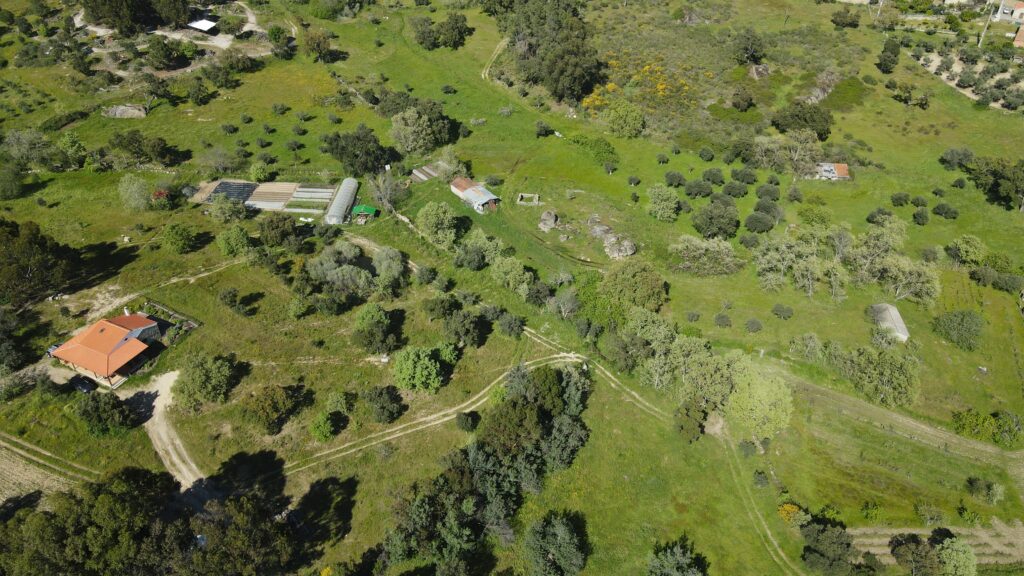
The biggest barrier to scaling small farms is the combination of financing, regulation, and access to markets. Small farms often lack the economies of scale that large-scale agricultural enterprises enjoy, making them less likely to be funded by investors. At the same time, administrative burdens and regulations are often geared towards large-scale production, which places disproportionate pressure on smaller producers. In addition, access to markets remains limited due to the dominance of large players in the food chain, making it difficult for small farms to get their products to consumers without going through expensive distribution systems.
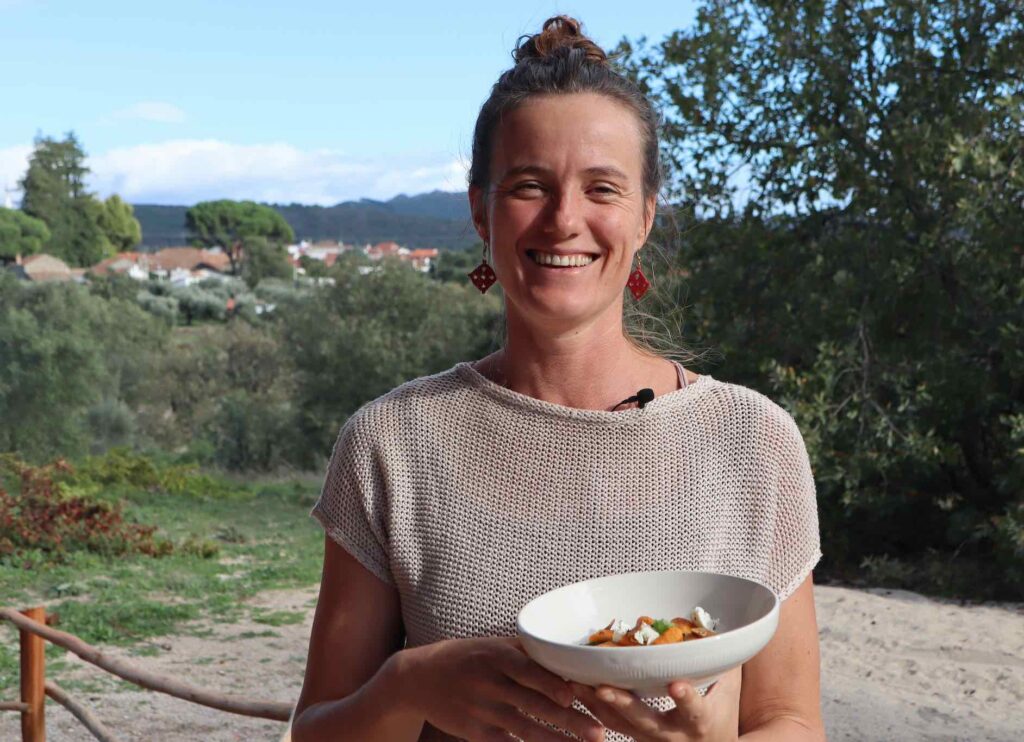

A salt-free, Indian-style spice rub with paprika, cumin and turmeric. Warming, aromatic and perfect for vegetables, legumes and slow cooking.
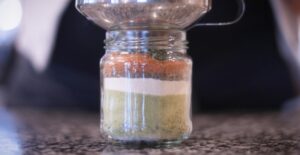
A fragrant, herb-forward spice rub inspired by Provence. Perfect for vegetables, chicken and olive-oil-based cooking.
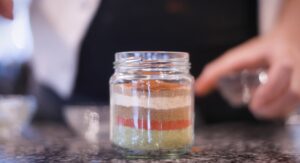
A savoury, umami-forward spice rub built on green pepper, cumin and chilli. Designed for vegetables, legumes and regenerative cooking — and layered beautifully for gifting.
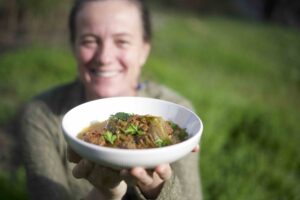
Perfect for large harvests, meal prep, and pantry storage
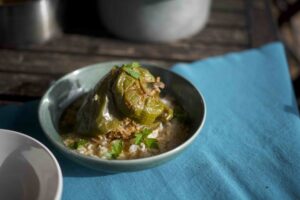
These stuffed peppers with rice and beef are tender, flavour-packed, and simmered in a rich tomato-beef broth. A perfect from-scratch recipe for using up lots of green bell peppers. Serves 25!
Let the future be tasty and let it be full of life!
We lost so much.
Our pastures are destroyed, many of our old olive trees, the young orchards, the irrigation systems, our most important tools, water pumps, and power setup—either melted or destroyed.
Our food and hay stores, the fences, and many of the stable buildings are either damaged or lost entirely.
What took years to build was reduced to ash in a single afternoon.
Ready to Recharge and Enjoy Real Food in Nature?
Cook, connect, and grow in the heart of our regenerative farm.
Real food. Deep rest. Lifelong memories.
